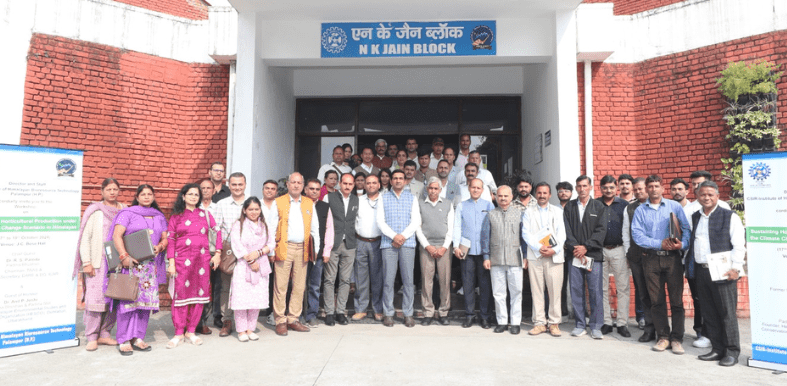Palampur: The CSIR-Institute of Himalayan Bioresource Technology (CSIR-IHBT) held a two-day workshop titled “Sustaining Horticultural Production under the Climate Change Scenario in the Himalayas” from October 17-18, 2024, at its campus in Palampur in Kangra district of Himachal Pradesh.
The event sought to identify and address the pressing challenges faced by farmers in the region as a result of climate change.
The workshop featured Padma Bhushan awardee Dr Rajendra S. Paroda, Chairman of TAAS and former Secretary of DARE & DG, ICAR, as the chief guest, along with other prominent experts like Dr P.L. Gautam, former DDG (crop science) and former Vice-Chancellor of G.B. Pant University, and Dr Sudesh Kumar Yadav, Director of CSIR-IHBT.
Also Read: https://thenewzradar.com/himachal-govt-to-pay-entire-pending-arrears-of-pensioners-aged-75-and-above-on-october-28-notification-out/
The key focus of the event was on enhancing crop productivity and increasing farmers’ income through high-value horticultural crops, while also addressing the growing impact of climate change on agriculture in the Himalayan region.
Dr Sudesh Kumar Yadav emphasised that a multipronged strategy involving diverse stakeholders is essential to combat the escalating effects of changing climatic conditions. The discussions at the workshop underscored the need for collaborative efforts between scientists, farmers and industry partners to safeguard and boost agricultural production in the northeastern states, Uttarakhand, Jammu & Kashmir and Himachal Pradesh.
The challenges faced by farmers, such as reduced soil fertility, poor water irrigation, rising input costs, reliance on conventional farming methods, and inadequate pest and disease management, were thoroughly analysed.
These issues have contributed to a decline in farm productivity, leading many farmers to explore alternative livelihoods.
Experts at the workshop proposed a variety of solutions, including the use of certified quality planting material, crop diversification and the cultivation of high-value crops like kiwi, peach, pear, lemongrass, ban kakri and wild marigold.
These crops offer significant market potential and could help improve farmers’ income. The inclusion of medicinal and aromatic crops in inter-cropping practices was also highlighted as a way to maximise land productivity.
Local farmers shared inspiring success stories, including cultivating dragon fruit, walnut, kiwi, and intercropping lemon grass with citrus fruits, which encouraged fellow participants to explore similar initiatives. The event concluded with Dr. Vipin Hallan, chief scientist and convener of the workshop, thanking all attendees for their active involvement.
The workshop provided valuable insights and practical solutions to the farmers of the region, fostering hope for more sustainable horticultural practices in the face of climate change.






